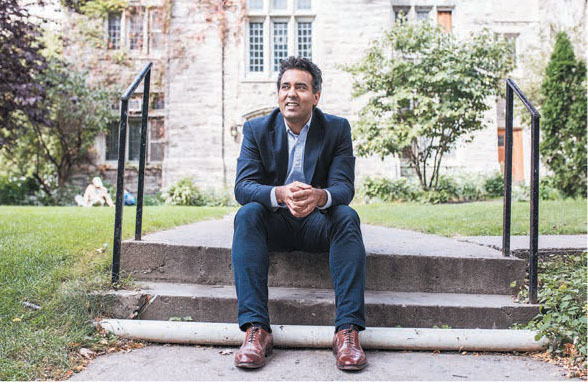New Canadian foundation interested in revitalizing downtown church spaces
Listen to our podcast
This year the foundation hopes to raise funds sufficient to open 12 sites.
A MONTREAL PASTOR believes "church buildings are the largest underutilized asset class in Canadian cities," and plans to change that. Graham Singh planted congregations in three closed churches, two in England and one in Guelph, Ont., before coming to St. Jax, Montreal in 2015.
When he arrived Singh closed the downtown Montreal Anglican church, which had a leaky roof, uneven foundation and difficult finances. He had the pews removed and changed the name from St. James the Apostle to a hipper-sounding St. Jax.

Montreal pastor Graham Singh’s Trinity Centres Foundation is looking to create multi-congregation locations in old church buildings in city centres across Canada.
These changes became the model for the Trinity Centres Foundation (www.TrinityCentres.org), a nonprofit being launched this year to revitalize and reinvigorate declining or closed churches. The foundation will work with downtown churches, most of which are mainline denominations, which have neither the people nor finances to revive the congregation or restore the building.
The combination of church and civic services will create a space for community, says Singh, citing an article that stated the number one disease in Canada is loneliness.
"Where can people go to beat loneliness?" Singh asks. "With urbanization and densification we’re running out of spaces to create community. Sharing a building sounds like a blessing, and when the city starts taking interest, we gain relational capital. They’ll want to learn about our beliefs, because we’re giving away the assets we steward."
The foundation, run by Singh, eventually hopes to create a hundred community hubs across Canada. Trinity Centres Foundation would purchase the building to rent it back to the denomination and other church plants, as well as community organizations or municipal services. St. Jax is currently used by five other churches, for-profit businesses that rent space, and groups who rented it for salsa dancing, choral and tap-dancing events.
Singh has developed partnerships in the Christian community (partly through his role as executive director of Church Planting Canada) and with legal advisors and government officials, as well as experts in management, property, finance and social transformation.
"One partner is the Blue Collar Theology Project, construction workers who talk to people about their faith," says Singh. "We envision also partnering with trade schools to create a specialist construction company with the passion and expertise for rebuilding heritage buildings."
This year the foundation hopes to raise funds sufficient to open 12 sites.
"We’ll be looking for those who realize there are no other options left. Multiple stakeholders are saying, ‘We have to get the building fixed,’" says Singh. The foundation will look for larger architecturally significant buildings in city centres that need restoration.
They’ll also look for church planters.
"We’re looking for churches happy working in a church/mixed faith centre, which have a genuine acceptance, embrace theological differences, and who recognize the Christ-centredness of churches other than their own," says Singh. "We’ll look at the most suitable congregations for a local area. One church may be more focused on young families. One church may be more traditional. And one church may be more ethnic."